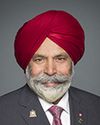Thank you for the question.
First, cannabis or marijuana for medical purposes is not on the formulary because it is not a prescription drug. It's not considered a drug, and it doesn't have a PIN. It doesn't have those criteria, so it's not on our formulary.
The OAG rightly identified the fact that we were paying a lot of money for marijuana and that the department should look into it, and Minister Hehr came out very clearly saying that we need a reimbursement policy for this. I think the committee will be happy to know that the reimbursement policy was announced and is being implemented now, as of November 22, whereby we will limit the amount to three grams per day, down from 10 grams, which was the limit before. In addition, we will cap the amount that we pay per gram to $8.50 per gram.
Now, I want to stress that it is not a prescription for marijuana, but a script, and Veterans Affairs does not provide scripts. We will pay, but it's the professional health care professionals or the doctors who work with the veterans who make the determination whether marijuana for medical purposes is the right substance to use.
The department in 2007 decided to pay for palliative clients based on compassionate grounds. Over the years, that use has gone up. In 2013-14, we had 112 clients, which is not very many. Then the courts made certain decisions, and some of the regulations surrounding the distribution or the availability of medical marijuana were changed.
We finished 2015-16 with just over 1,700 veterans using marijuana for medical purposes. This year, in the first six months there are just over 3,000. As you can see, there's been a pretty significant increase, and it is not due to Veterans Affairs providing the scripts. I want to be very clear. It is more and more doctors and health professionals deciding that our veterans could have some use for it. Now, we are very concerned with the health and well-being of our veterans, and hence the minister came in with the new requirements.
To answer your questions about a decrease in other areas, we did a review about six months ago, following the OAG's visit, of whether there was—because we were hearing anecdotal evidence that there was—a decrease in opioids, or benzanines, or such medications. The review at the time did not demonstrate that. It demonstrated that our numbers are staying pretty consistent in that area, but that the use of marijuana was going up.
Now, if you look at our public reports, you will say, “Well, sir, your numbers are going down for opioids”. That is not because of the people using marijuana. We compared people using marijuana and people using opioids. Our veteran population is decreasing; we now have 670,000 veterans. Therefore, the use of opioids, benzanines, and other medications is decreasing because of the decrease in the number of veterans.
We actually did a correlation between veterans using marijuana and veterans using other drugs to see whether, in that population, there was a decrease, and at that moment there was nothing of any significance.
I hope I've answered all your questions, sir.




